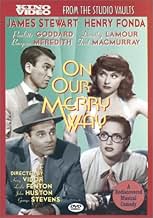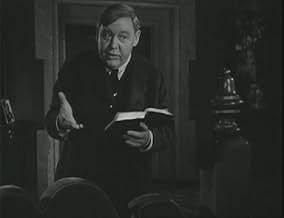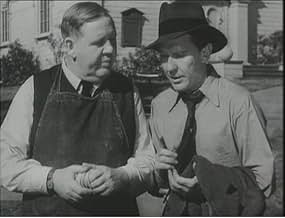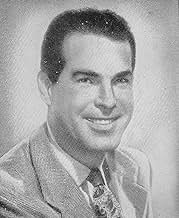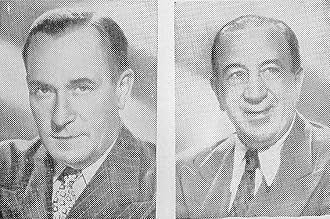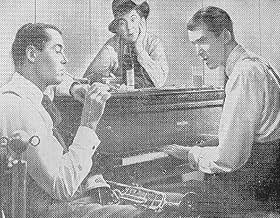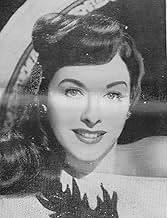AVALIAÇÃO DA IMDb
5,7/10
926
SUA AVALIAÇÃO
Adicionar um enredo no seu idiomaThree short stories revolving around the topic of the daily question posed by the roving reporter to the readers of a daily newspaper.Three short stories revolving around the topic of the daily question posed by the roving reporter to the readers of a daily newspaper.Three short stories revolving around the topic of the daily question posed by the roving reporter to the readers of a daily newspaper.
Carl 'Alfalfa' Switzer
- Leopold 'Zoot' Wirtz
- (as Carl Switzer)
Avaliações em destaque
¨A Miracle Can Happen" was the original title of this film , it deals with a down-and-out reporter called Oliver Pease (Burguess Meredith) gets a dose of courage from his wife Martha (Paulette Goddard) as she suggests him an interesting inquiry : "Has a little child ever changed your life?" . Oliver gets answers from two slow-talking musicians (Henry Fonda and James Stewart) , the second sequence Charles Laughton played a bible-reading minister , and the third part about an itinerant couple (Fred MacMurray , William Demarest) who is deceived by a child . In each case the "little child" is hardly innocent: in the first, a local auto mechanic's "baby" results out to be fully developed as a beautiful girl ; in the second , an unfortunate church Minister (Charles Laughton) teaches a grumpy father (Henry Hull) to learn kindness by Bible reading ; in the third, the family of a spoiled brat doesn't want him returned . Did You Ever See A Miracle Walking?
This is a sketches movie full of humor , fun situations , entertainment and amusement . Interesting screenplay by Laurence Stallings and Lou Breslow based on original story by Arch Oboler . The picture is made up of many vignettes featuring many capable stars , it belongs to sub-genre about ¨anthology film¨ ; movies like "Flesh and Fantasy" and "O. Henry's Full House" used large casts to tell several interlocked stories , though "Tales of Manhattan" is the best of the anthology films , it follows the adventures of a tuxedo's tailcoat as it passes through the hands of several diverse people , being also starred by Laughton and Fonda . This ¨A miracle can happen¨ consisted of three short stories , about 20-25 minutes each , linked by the Burgess Meredith character. Titled "A Miracle Can Happen", this film debuted on February 3, 1948 at the Warner Theatre in Manhattan , during February, the feature also opened in Philadelphia and Detroit ; in June, when released nationally, the picture ran nine minutes shorter than its original 107 minutes, and the film's name had been changed to "On Our Merry Way," thus avoiding any religious connection that moviegoers might assume by seeing the word "miracle" in the title . Nice acting by Burguess Meredith as a misfit journalist pursued by a creditor , he writes lost pet notices and looking for a good scoop he tricks the editor of the newspaper . Sensational duo formed by Henry Fonda and James Stewart , they are fabulous as an amusing couple become involved into a funny contest . Charles Laughton plays masterfully an unlucky Minister ; however, this segment was eliminated in some copies with a parody of an actress whose roles usually feature a sarong as Dorothy Lamour's South Seas movies , as the powers-that-be decided to drop this 'religious' story altogether and it was replaced by a more comic one . Independent producer David O. Selznick offered to buy the film in order to issue the Laughton sequence as a short, scrapping the rest of the picture ; Selznick's plan was rejected by producer Benedict Bogeaus and producer-star Burgess Meredith . In Spain, "A Miracle Can Happen", complete with the original Laughton sequence intact but of course without the alternative Dorothy Lamour story , as it has been released on DVD there, and retains the English-language soundtrack, the movie can now been seen as it was originally intended .
Extraordinary support cast formed by notorious secondaries such as Harry James , Victor Moore , William Demarest , Hugh Herbert , Eduardo Ciannelli , Henry Hull , John Qualen and Carl 'Alfalfa' Switzer . The film has an atmospheric cinematography carried out by four prestigious cameramen as Joseph F. Biroc , Edward Cronjager , John F. Seitz and uncredited Ernest Laszlo . Evocative and appropriate original musical score by Heinz Roemheld . The motion picture was well directed by four classic Hollywood filmmakers as King Vidor, Leslie Fenton and, uncredited, John Huston and George Stevens . Rating : Good film , 6'5/10 .Well worth watching .
This is a sketches movie full of humor , fun situations , entertainment and amusement . Interesting screenplay by Laurence Stallings and Lou Breslow based on original story by Arch Oboler . The picture is made up of many vignettes featuring many capable stars , it belongs to sub-genre about ¨anthology film¨ ; movies like "Flesh and Fantasy" and "O. Henry's Full House" used large casts to tell several interlocked stories , though "Tales of Manhattan" is the best of the anthology films , it follows the adventures of a tuxedo's tailcoat as it passes through the hands of several diverse people , being also starred by Laughton and Fonda . This ¨A miracle can happen¨ consisted of three short stories , about 20-25 minutes each , linked by the Burgess Meredith character. Titled "A Miracle Can Happen", this film debuted on February 3, 1948 at the Warner Theatre in Manhattan , during February, the feature also opened in Philadelphia and Detroit ; in June, when released nationally, the picture ran nine minutes shorter than its original 107 minutes, and the film's name had been changed to "On Our Merry Way," thus avoiding any religious connection that moviegoers might assume by seeing the word "miracle" in the title . Nice acting by Burguess Meredith as a misfit journalist pursued by a creditor , he writes lost pet notices and looking for a good scoop he tricks the editor of the newspaper . Sensational duo formed by Henry Fonda and James Stewart , they are fabulous as an amusing couple become involved into a funny contest . Charles Laughton plays masterfully an unlucky Minister ; however, this segment was eliminated in some copies with a parody of an actress whose roles usually feature a sarong as Dorothy Lamour's South Seas movies , as the powers-that-be decided to drop this 'religious' story altogether and it was replaced by a more comic one . Independent producer David O. Selznick offered to buy the film in order to issue the Laughton sequence as a short, scrapping the rest of the picture ; Selznick's plan was rejected by producer Benedict Bogeaus and producer-star Burgess Meredith . In Spain, "A Miracle Can Happen", complete with the original Laughton sequence intact but of course without the alternative Dorothy Lamour story , as it has been released on DVD there, and retains the English-language soundtrack, the movie can now been seen as it was originally intended .
Extraordinary support cast formed by notorious secondaries such as Harry James , Victor Moore , William Demarest , Hugh Herbert , Eduardo Ciannelli , Henry Hull , John Qualen and Carl 'Alfalfa' Switzer . The film has an atmospheric cinematography carried out by four prestigious cameramen as Joseph F. Biroc , Edward Cronjager , John F. Seitz and uncredited Ernest Laszlo . Evocative and appropriate original musical score by Heinz Roemheld . The motion picture was well directed by four classic Hollywood filmmakers as King Vidor, Leslie Fenton and, uncredited, John Huston and George Stevens . Rating : Good film , 6'5/10 .Well worth watching .
Not the "rediscovered gem from the Golden Age of Cinema" as it is proclaimed on the Kino Video DVD case, but a curiosity nonetheless. It is an anthology movie with four different stories tied together by a young Burgess Meredith asking the question "How has a child influenced your life?" The most successful sequence (directed by the unbilled John Huston & George Stevens) involves James Stewart and Henry Fonda as a couple of down-on-their-luck musicians. Not only is it great to see these two real-life pals work together for the first time, but their chemistry & easy slapstick antics are quite funny. Seeing Henry Fonda playing the trumpet while gradually getting seasick, and taking Carl "Alfalfa" Switzer down with him, is worth the whole movie. I guess the copyright on O. Henry's "The Ransom of Red Chief" had expired as the Fred MacMurray, William Demerest sequence (years before they were teamed again on T.V.'s "My Three Sons") is a blatant and not very inspired rip-off.
And then just sinks into boredom.
Martha Pease (Paulette Goddard) demands that her husband Oliver (Burgess Meredith) tell the newspaper where he works as the "Roving Reporter" that he be allowed to pick his own subjects. She will know if he did that by reading the next edition's Rambling Reporter column and seeing that his idea - How has a small child influenced your life? - is the theme of the column.
After leaving his apartment that morning Oliver confesses to the audience that he is not the Roving Reporter. He is in fact just a classified ad clerk, but that he told his wife this lie before they were married and hasn't had the heart to tell her the truth ever since. As a result he has been lying about his salary and thus he is in peril of having his furniture repossessed and he owes gambling debts. This is all very interesting, but then it just bogs down. And that is hard to believe when one of the vignettes involving people on the street actually being interviewed includes James Stewart and Henry Fonda, good friends in real life, on screen together.
When I first sat down to watch this I wondered why I had never heard of this one. By the time it finished I knew the answer to that question. Avoid.
Martha Pease (Paulette Goddard) demands that her husband Oliver (Burgess Meredith) tell the newspaper where he works as the "Roving Reporter" that he be allowed to pick his own subjects. She will know if he did that by reading the next edition's Rambling Reporter column and seeing that his idea - How has a small child influenced your life? - is the theme of the column.
After leaving his apartment that morning Oliver confesses to the audience that he is not the Roving Reporter. He is in fact just a classified ad clerk, but that he told his wife this lie before they were married and hasn't had the heart to tell her the truth ever since. As a result he has been lying about his salary and thus he is in peril of having his furniture repossessed and he owes gambling debts. This is all very interesting, but then it just bogs down. And that is hard to believe when one of the vignettes involving people on the street actually being interviewed includes James Stewart and Henry Fonda, good friends in real life, on screen together.
When I first sat down to watch this I wondered why I had never heard of this one. By the time it finished I knew the answer to that question. Avoid.
As the "Trivia" section states, Charles Laughton was in the original version of this film under its title "A Miracle Can Happen". His was a sequence of 20 minutes or so which came between the Fonda/Stewart story and the one with Fred MacMurray which ended the movie. During the war, Laughton had taken to reading from great works of literature, including the Bible, to invalided US servicemen. He continued to give reading tours after the war and his appearance in "A Miracle Can Happen" was clearly an attempt to put one of his Bible readings on film. He played a washed-out minister who bores his congregation to tears, but one rainy night a small boy asks Laughton to visit his sick father. In an attempt to boost the dying man's spirits, Laughton rises to the occasion with an over-the-top delivery of the Saul and David story that completely revitalises the father. It then turned out that the little boy who invited Laughton in, but who has now disappeared from the scene, had died some years earlier. So, as Laughton told Meredith at the end of the sequence, "a miracle happened."
For whatever reason, the Laughton sequence was deleted from the US release but not before prints has been sent abroad to other countries. Consequently, it has long been known that, for example, a Spanish version of "A Miracle Can Happen" - with Laughton and all the others dubbed into that language - has been seen on TV in Spain and is now available there on DVD, complete with the original English dialogue.
With Laughton having been deleted, the Dorothy Lamour sequence was added in as a replacement, and the film was duly re-titled "On Our Merry Way." I agree with the sentiments expressed by others who find this film an embarrassment all round. Fonda and Stewart are no masters of farcical comedy and neither are any of the other principals. As for Laughton in the original film, his hamming up of the Bible story has to be seen to be believed. Nevertheless, both versions are of some interest because of the talents involved but I agree with anyone who says that once you've seen either version you're not likely to want to see them again!
For whatever reason, the Laughton sequence was deleted from the US release but not before prints has been sent abroad to other countries. Consequently, it has long been known that, for example, a Spanish version of "A Miracle Can Happen" - with Laughton and all the others dubbed into that language - has been seen on TV in Spain and is now available there on DVD, complete with the original English dialogue.
With Laughton having been deleted, the Dorothy Lamour sequence was added in as a replacement, and the film was duly re-titled "On Our Merry Way." I agree with the sentiments expressed by others who find this film an embarrassment all round. Fonda and Stewart are no masters of farcical comedy and neither are any of the other principals. As for Laughton in the original film, his hamming up of the Bible story has to be seen to be believed. Nevertheless, both versions are of some interest because of the talents involved but I agree with anyone who says that once you've seen either version you're not likely to want to see them again!
This odd, freewheeling, independently-made compendium film emerges as little more than a glorified home movie (despite the considerable talent involved) but is certainly watchable and entertaining in itself. The linking narrative revolves around married couple Burgess Meredith and Paulette Goddard (at the time hitched in real life): she's an artist and he a lowly employee with a newspaper aspiring to be a journalist; while attempting to flee a creditor, he meets and interviews a number of people about the influence of children in their lives.
The three 'stories' are quite nice with all the various performers contributing generous and relaxed cameos: the first concerns down-and-out musicians Henry Fonda and James Stewart and their involvement in an instrumental contest taking place in a small town (they're all too ready to appease the mayor who has promised them a lot of money if his son is allowed to win but, thanks to the intervention of trumpeter Harry James, a multi-talented girl emerges the clear winner and eventually becomes the owner of Fonda and Stewart's band!); the second finds Dorothy Lamour parodying her former image of a sarong girl (she's a bit player whose opportunity for stardom finally arises out of a disastrous stint in a vehicle for a spoilt child star); the last story, reminiscent of O. Henry's "The Ransom Of Red Chief" (later filmed by Howard Hawks), involves ex-con magician Fred MacMurray and how he and his partner William Demarest stumble upon a boy in the woods and are continually outwitted by him (he's actually fleeing from his eccentric banker uncle but MacMurray eventually discovers his true identity and, in the end, the boy and his elder sister join in on the magic act).
The three 'stories' are quite nice with all the various performers contributing generous and relaxed cameos: the first concerns down-and-out musicians Henry Fonda and James Stewart and their involvement in an instrumental contest taking place in a small town (they're all too ready to appease the mayor who has promised them a lot of money if his son is allowed to win but, thanks to the intervention of trumpeter Harry James, a multi-talented girl emerges the clear winner and eventually becomes the owner of Fonda and Stewart's band!); the second finds Dorothy Lamour parodying her former image of a sarong girl (she's a bit player whose opportunity for stardom finally arises out of a disastrous stint in a vehicle for a spoilt child star); the last story, reminiscent of O. Henry's "The Ransom Of Red Chief" (later filmed by Howard Hawks), involves ex-con magician Fred MacMurray and how he and his partner William Demarest stumble upon a boy in the woods and are continually outwitted by him (he's actually fleeing from his eccentric banker uncle but MacMurray eventually discovers his true identity and, in the end, the boy and his elder sister join in on the magic act).
Você sabia?
- Curiosidades"A Miracle Can Happen" was the original title of this film when released on Feb. 3, 1948 at the Warner Theater in Manhattan. It consisted of three short stories (about 20-25 minutes each) linked by the Burgess Meredith character. He played a reporter looking for a good scoop, and in the second sequence, Charles Laughton played a bible-reading minister. When it was released nationally in June, however, it had been decided that the religious story would be dropped and replaced by a more comic one featuring Dorothy Lamour. The film in this new version was then re-titled "On Our Merry Way". However, prints of the original film had already been sent abroad for dubbing. In Spain, "A Miracle Can Happen" became "Una Encuesta Llamada Milagro", complete with the original Laughton sequence intact (but without the alternative Lamour story). As it has been released on DVD there and retains the English-language soundtrack, the movie can be seen as it was originally intended.
- Versões alternativasThe version released in Spain and always seen on both TV and DVD, in dubbed and subtitled versions (bearing the title card "A Miracle Can Happen"), includes the Charles Laughton episode but not the Dorothy Lamour one.
- ConexõesFeatured in Henry Fonda: The Man and His Movies (1982)
Principais escolhas
Faça login para avaliar e ver a lista de recomendações personalizadas
- How long is On Our Merry Way?Fornecido pela Alexa
Detalhes
- Data de lançamento
- País de origem
- Idioma
- Também conhecido como
- On Our Merry Way
- Locações de filme
- Empresa de produção
- Consulte mais créditos da empresa na IMDbPro
- Tempo de duração1 hora 47 minutos
- Cor
- Proporção
- 1.37 : 1
Contribua para esta página
Sugerir uma alteração ou adicionar conteúdo ausente

Principal brecha
By what name was No Nosso Alegre Caminho (1948) officially released in India in English?
Responda
